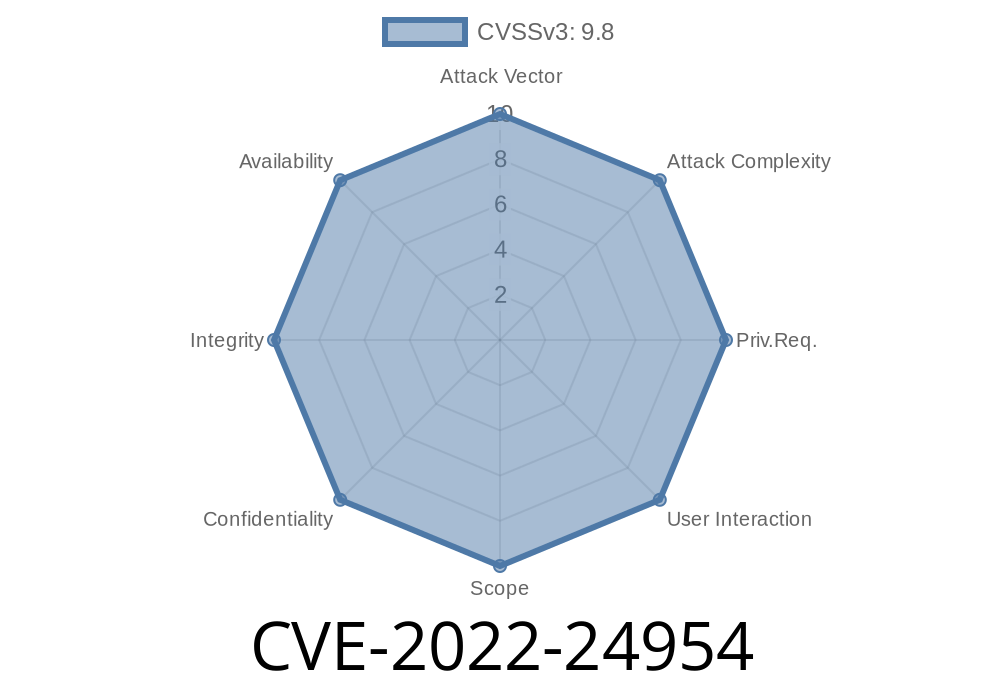Foxit PDF Reader and Foxit PDF Editor are two intensely popular tools for managing and editing PDF files. Millions of users rely on these programs daily, trusting in their speed and reliability. But, like any software, they aren’t immune to flaws. One serious bug—CVE-2022-24954—was recently unearthed in both Foxit PDF Reader (before 11.2.1) and Foxit PDF Editor (before 11.2.1), threatening users’ safety through a stack-based buffer overflow vulnerability in the way these apps parse certain PDF elements.
In this post, I'll walk you through what this vulnerability is, how it works, and show example code snippets to help you better understand it. We’ll also go over references where you can learn more and ways you can protect yourself.
What is CVE-2022-24954?
The core of the issue resides in how Foxit PDF software parses embedded XML Forms Architecture (XFA) within PDFs, particularly the colSpan attribute. When parsing certain malformed values like colSpan="-2" within a <subform> tag or colSpan="1" within a <draw> tag, the application fails to properly check or restrict the value’s range and type. This results in a stack-based buffer overflow, granting an attacker potential arbitrary code execution—just by tricking someone into opening a specially crafted PDF.
In short: If you open a malicious PDF with the vulnerable Foxit PDF Reader or Editor, an attacker could hijack your computer.
How Does the Buffer Overflow Work?
A buffer overflow occurs when a program writes more data to a buffer (a block of memory) than it can hold. This can overwrite neighboring memory and, if exploited carefully, can allow attackers to run their own code.
In the case of CVE-2022-24954, when Foxit reads invalid colSpan values inside specific tags within the XFA section, it doesn’t properly validate the provided value. This lets an attacker overwrite critical parts of memory via stack buffer overflow.
Minimal Malicious PDF Example
The exploit relies on specially crafted PDF files. Here’s a trimmed-down example of the vulnerable XFA fragment inside a fake PDF structure:
<xfa:subform colSpan="-2">
<xfa:draw colSpan="1">
<!-- exploit payload could be hidden herein -->
</xfa:draw>
</xfa:subform>
Placed inside a PDF’s XFA Form, this causes the vulnerable Foxit application to misinterpret the colSpan value and write data past boundaries on the stack.
Note: This is a simplified snippet for illustration. Real-world exploits protect their payload and obfuscate XML for evasion.
Crafting an Exploit: Step-by-step Overview
1. Create Malicious PDF: Use a PDF library or hex editor to craft a PDF with malicious XFA tags (subform colSpan="-2", draw colSpan="1").
2. Embed Malicious Payload: The overflow can be used to place shellcode or overwrite return addresses to hijack program flow.
3. Distribute PDF: Email, host online, or use other social engineering tricks to get a victim to open your PDF.
4. Trigger Exploit: Once the PDF is opened, the overflow occurs and may execute the attacker’s code, potentially installing malware or backdoors.
Important: Sharing or using real exploit code for malicious purposes is illegal. The intention here is educational—to help defenders understand and counter such threats.
How to protect yourself
- Update Now. Foxit patched the issue in Reader and Editor version 11.2.1. Download the latest version here.
Resources and References
- CVE-2022-24954 at NVD
- Foxit Security Bulletin
- Exploit Details on Exploit-DB _(proof of concept)_
Final Thoughts
CVE-2022-24954 is a reminder that even trusted software can hide dangerous flaws. If you use Foxit PDF tools, check your version and patch without delay! The vulnerability highlights why software updates matter, and why users must be careful when opening files, even seemingly harmless ones like PDFs.
Stay safe—keep your software up to date and learn about the risks, so exploits don’t catch you off guard.
Did You Patch Foxit Yet?
Let us know your update strategies or concerns in the comments below!
Timeline
Published on: 02/11/2022 02:15:00 UTC
Last modified on: 02/17/2022 03:27:00 UTC
